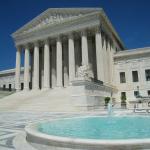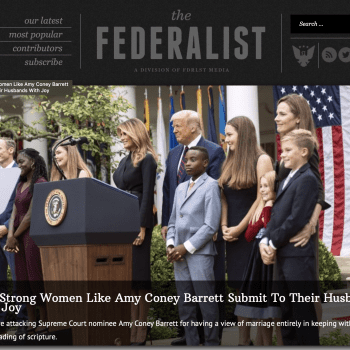Tchiya Amet has been alleging for years that Neil DeGrasse Tyson drugged and raped her while they were in graduate school together in the 1980s. I don’t recall hearing about these allegations until a month ago, when David McAfee, a blogger at No Sacred Cows, also on the Patheos nonreligious channel, published an interview with Amet. While Amet’s allegations had been floating around since 2010, McAfee explained, they had never been taken seriously—or investigated.
Some responded to McAfee’s post with some skepticism, pointing to Amet’s interest in astrology and other “woo” as a reason for questioning her account. Amet said she was in graduate school with Tyson in the 1980s, but was there any actual evidence that the two of them knew each other? McAfee said that his interest in the case stemmed from the fact that Amet’s allegation had never been investigated. In 2014, Amet filed a police report in Austin; the department did not investigate because the 10 year statute of limitations had passed. Tyson’s employers, too, did not appear to have ever investigated.
After his November post, which included an interview with Amet and verification that she and Tyson were both at UT Austin at the same time, McAfee was contacted by two women who alleged that Tyson had sexually harassed them. Both allegations were much more recent in nature. McAfee then posted these allegations.
After describing allegations by Dr. Katelyn Allers that Tyson groped her at a 2009 astronomical society meeting—under the guise of attempting to confirm whether her solar system tattoo included Pluto—McAfee added the following:
I confirmed with Dr. Michele Thornley, an associate professor of physics and astronomy at Bucknell, that Dr. Allers told her about Tyson’s behavior in 2013 when he was scheduled to speak at the University.
What was it that Allers confided in Thornley?
“Katelyn described the earlier incident to me in the fall of 2013, after she was invited to attend a dinner with Dr. Tyson when he was to be on campus in spring 2014 as a speaker in Bucknell’s “Tech/no” series. I had recently served on a university committee with one of the organizers of the series, so I arranged to meet with that person and indicated privately that Katelyn did not wish to attend the dinner, and spoke in general terms the reasons why. At that time, Katelyn expressed that she did not want to pursue the issue more publicly (e.g., broadly inform the organizing committee, or try to get the invitation to speak withdrawn), so I talked with the organizer privately about two things: (1) to be sure that Katelyn was no longer expected at dinner, and (2) some general recommendations to avoid having female students meeting with him in small groups without additional members of the community present.”
Two things are worth noting here. First, Allers spoke about the incident with Tyson years before she decided to go public about it. This adds a great deal of credibility to her allegation. Second, Tyson’s behavior affected Allers so profoundly that she chose to forgo potentially career advancing opportunities in order to avoid being around him. Keep an eye on this, because it’s going to become a bit of a theme.
The other woman who approached McAfee about her experiences was Ashley Watson, who worked as Tyson’s personal assistant during filming for Cosmos this past spring. Watson alleges that Tyson invited her to his room, made sexually inappropriate comments, and spoke of needing a “release.” He also told her that he would like to hug her, but that if he did “he’d just want more.” She fled his apartment. The next day, she said, he told her that she was “too distracting.”
Watson says she decided to quit after the negative interactions with Tyson, and that she told the story to at least one supervisor in hopes that he wouldn’t hire more female assistants for the astrophysicist. That person reportedly supported her decision to quit, and said she should tell everyone she had a family emergency to avoid more uncomfortable situations.
Like Allers, Watson told someone about her experience before she had any thought of going public about what happened. Also like Allers, Watson chose to take a career hit to avoid being around Tyson.
As I browsed the comment sections on various blogs, there were many who dismissed Allers and Watson’s allegations. So what if he made them a little uncomfortable? He’s probably just a bit socially awkward! They need to grow a thicker skin! Besides—Tyson does good science! Just let him do science! No. No, he can’t just do science, because as Allers and Watson’s accounts make clear, Tyson’s behaviors affect the female scientists around him, sometimes damaging their careers.
There is now a fourth allegation:
Now a fourth woman has told BuzzFeed News her experience of sexual harassment from Tyson. In January 2010, she recalled, she joined her then-boyfriend at a holiday party for employees of the American Museum of Natural History. Tyson, its most famous employee, drunkenly approached her, she said, making sexual jokes and propositioning her to join him alone in his office. In a 2014 email shared with BuzzFeed News, she described the incident to her own employer in order to shoot down a proposed collaboration with Tyson.
Like Allers and Watson, this individual also told someone long before deciding to go public—and like Allers and Watson, she, too, turned down career opportunities to avoid being in close proximity with Tyson.
Male scientists who harass women cannot “just do science” without torpedoing the opportunities of female scientists. (And no, women should not have to choose between furthering their careers, on the one hand, and feeling safe around their colleagues on the other.) This is why we cannot let sexual harassment slide on the grounds that a person is good at doing science—or even on the grounds that a person is “the most famous black scientist in history.”
After all, as noted in a well-researched Buzzfeed article published last week:
Over the course of nearly three years, BuzzFeed News has spoken with more than 30 people for this story, including the alleged victims and their families, Cosmos crew members, and graduate students and professors who were at UT Austin 30 years ago. Dozens more from that time did not reply to requests for interviews.
Most of the people interviewed lamented the prospect that damaging allegations might take down the world’s most famous living scientist — and perhaps the most famous black scientist in history — beloved for eviscerating so many of the stereotypes of the stuffy, out-of-touch academic.
But for Watson and Allers, the tragedy was the loss of a different black scientist: Amet.
Amet was, by all accounts (and as laid out in the Buzzfeed article), a hard worker and a motivated scientist. Indeed, her career looked like it was headed in a positive direction at exactly the moment her alleged rape by Tyson derailed her. She dropped out of graduate school and disappeared. Other students at UT Austin at the time told Buzzfeed that they had found Amet’s sudden disappearance odd. Why had she left school? What happened?
And, as Buzzfeed also reports, Amet did tell someone about her experience with Tyson, decades before she went public about it:
Amet’s ex-husband, Mario Vela, told BuzzFeed News that around the time he first met her in 1986, she told him something bad had happened with Tyson, and that he came up many times throughout their marriage. Though Vela never heard her use the word “rape,” he did remember that she described being drugged by Tyson, and vaguely alluded to something traumatic. “It actually was a sore subject,” he said. “It bled onto our relationship. It caused emotional problems for her.”
I find the allegations against Tyson credible. In his response, Tyson corroborated many of the details. He asserts that he never raped Amet, but he does not deny knowing her or being close to her—he states that he and Amet dated (something she denies). He admits that he probably did search for Pluto under Allers’ dress—he has a professional interest in whether people include Pluto in their tattoos. Besides, “this was simply a search under the covered part of her shoulder of the sleeveless dress” (what does that mean?). He acknowledges that he did Watson that if he hugged her he “might want more”—on more than one occasion, he says—but says he was attempting to “express restrained but genuine affection.”
Nothing in Tyson’s response reassured me in the least. In the end, my feelings are in line with those of Chanda Prescod-Weinstein, a Black physics professor at the University of New Hampshire, who wrote the following in Scientific American:
While some will be celebrating the inevitable damage these accusations do to Tyson’s public image, I cannot. I will instead worry about what will happen to the Google search results for “Black scientist.” I will instead be reminded that the United States is a place where there are a multitude of visible white men science superstars, but only one Black person could get his foot through that door. I will wonder how different things might go in a society where taking responsibility was encouraged by a foundational investment in restorative justice.
I will also feel angry at Neil. It’s true that some details of these allegations have yet to be corroborated, and both Fox News and National Geographic have launched investigations. But in my view, I believe the claims are credible, which means he directly harmed multiple women, most egregiously by allegedly raping a member of his own already marginalized community. Tchiya Amet is a Black woman who will never join me on the list of African-American Women with PhDs in Physics. She deserved better. Our whole community did.
My tween daughter was in the kitchen with the radio on when NPR reported on the allegations against Tyson last week. She came dashing out of the kitchen, her eyes wide. “Mom! Mom, listen to what they’re saying about Neil DeGrasse Tyson!” Tyson has been one of her heroes. In fact, a year or two ago I looked into the locations where Tyson was scheduled to speak, because she so badly wanted to go hear him speak herself. I was at a loss as to what to tell her—and so, so sad.
It’s not just my white daughter. While at my kids’ school last week, I saw a book display that included a biography of Tyson. Should it be taken down? I wondered, but didn’t say anything. A plurality of the kids at this school are black or mixed-race. They need strong black role models. I waver. Why deprive them of that by removing books about Tyson? My daughter’s best friend is a black girl with her eyes set on being a scientist. And then, for a moment, I look at her and see Amet.
There are no winners here. There are only losers, and more losers. When I’m tempted to feel angry at Tyson—and I do feel angry at him—I remind myself that no white scientist is asked to bear the burden of letting down their entire race if they make bad choices. What kind of world do we live in where we have only one famous black scientist?
We need to do better than this.
(For further reading, see Neil DeGrasse Tyson and the Careers That Weren’t.)
I have a Patreon! Please support my writing!















